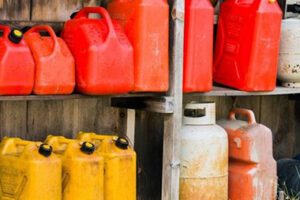Have your old fuel collected
Contact us to have your old fuel collected at your business location. Our specialists will be happy to make you a competitive and non-binding offer.
There are a number of rules and guidelines for disposing of old fuel that you as a company must adhere to. Companies in the automotive sector, for example, that deal with surplus or outdated fuel, such as petrol or diesel, are required to ensure safe and responsible storage and collection.
Incorrect storage or disposal of outdated or contaminated fuel residues is dangerous and can lead to environmental damage and regulatory problems. In this article we explain how you as a company can best dispose of old fuel, what the costs are and how long this type of chemical waste has a shelf life.

Private individuals can hand in old fuel at municipal collection points, such as waste disposal sites or recycling centres. However, companies must arrange for their own certified waste collector to take care of the disposal. In any case, old fuel should never simply be thrown away as residual waste or poured into the sewer. This would cause serious environmental pollution and also create dangerous situations.
Do you want to dispose of petrol residues or dispose of old diesel? Chemical Waste Netherlands offers a collection service for companies. In addition, we can supply special UN-approved containers for storage. We will come to your location on request to collect the old fuel for responsible processing according to the latest environmental regulations.
Yes, fuel is considered chemical waste when it is no longer usable. Fuels contain harmful components that can be dangerous to the health of humans, animals and nature if they are handled incorrectly. That is why there are strict rules for the storage, transport and processing of old and dirty fuel residues. Disposal therefore requires a careful approach via recognised collectors and certified processors of hazardous substances.
The costs for the disposal of old fuel depend on a number of factors, such as the quantity, the type of fuel and the location of your company. Furthermore, the way of packaging also plays a role. For example, diesel and petrol must be stored in approved barrels, jerry cans or lid drums. If this is not the case, there are additional costs for renting containers.
By requesting a no-obligation quote from us, you will get a good idea of the costs you can expect. You pay a fixed amount per collection order and also a price per liter. It can therefore be wise to make a good estimate of the number of liters yourself in advance, so that you know the total amount you can expect approximately.
Petrol and diesel have a limited shelf life, although this varies by fuel type. Petrol will last between three and six months under ideal conditions. Diesel generally has a slightly longer shelf life, namely six to twelve months. After these periods, the quality and efficiency of the fuel begins to decline, which can lead to oil filter and engine problems.
The use of old fuel is generally not recommended, especially if the fuel is significantly old or contaminated. Petrol stored for more than 6 months can undergo chemical changes that negatively affect engine performance. Diesel fuel older than 12 months can become contaminated by the growth of bacteria and fungi, especially if it has come into contact with water.
If the fuel is only a few months old and has been stored in good conditions, you may be able to reuse a small amount by mixing it with fresh fuel. However, if it shows signs of contamination or deterioration, such as an off odor or color, it is better and safer to dispose of it.
Gasoline will last approximately up to 6 months in the tank. This shelf life only applies if a tank is properly sealed and the vehicle is stored in a cool, dark environment. As gasoline ages, it begins to deteriorate after 3 months, which can lead to clogged fuel filters and poor engine performance.
Diesel will last approximately 12 months in the tank. However, the car or vehicle must be in a dark, cool place and the tank must be properly sealed. Diesel oil deteriorates in quality after approximately 6 months. There may be fungi and bacteria develop, especially if there is water or condensation in the tank. Regularly checking the fuel tank for odor, color and fluidity is therefore advisable to prevent clogged fuel filters and engine damage.
Responsible disposal of fuel residues is essential to prevent environmental damage and to comply with legislation. Companies are responsible for ensuring that old fuel is processed by approved chemical and hazardous waste processors. By offering it safely and in the correct packaging, you not only prevent environmental damage, but also possible fines for non-compliance with waste management regulations.
Additionally, you may want to consider taking measures to minimize the buildup of stale fuel, such as regularly checking inventory and using stored fuel in a timely manner. This can help reduce costs and risks and support more efficient operations.
Contact us to have your old fuel collected at your business location. Our specialists will be happy to make you a competitive and non-binding offer.
